Throughout Black History Month, the Center recognizes extraordinary African Americans throughout the nation’s history. Celebrate Black History Month by viewing our exhibits featuring some of the many African Americans who transformed constitutional history—including Frederick Douglass, Ida B. Wells, Robert Smalls, and Sojourner Truth—to better understand the long fight for freedom and equality.
Black History Month
- Date
- Saturday, February 1 - Friday, February 28
- Time
- All Day
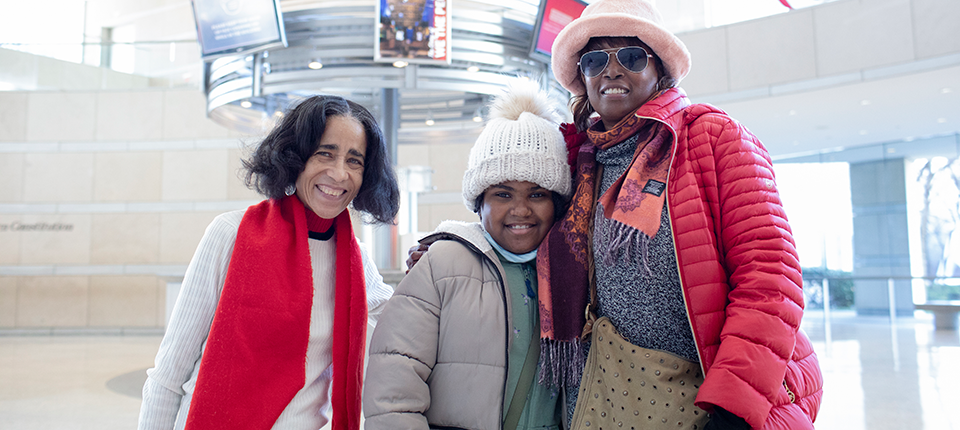
Programs at the Museum
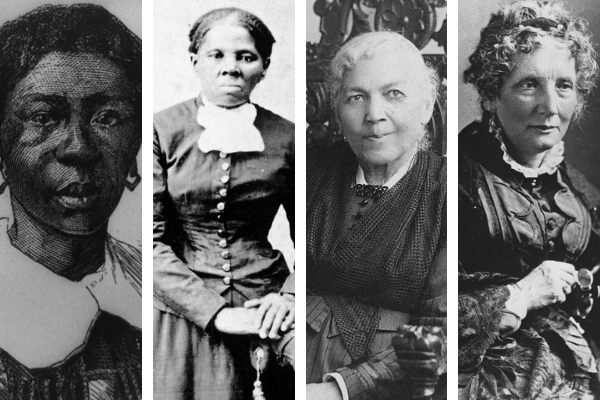
The Four Harriets of History Program
10:45 a.m. and 12:45 p.m., The Story of We the People, Second Floor
Explore the lives of four American women—Harriet Robinson Scott, Harriet Tubman, Harriet Jacobs, and Harriet Beecher Stowe—who confronted slavery through literature, lawsuits, and direct action in their efforts to free themselves and others from bondage.
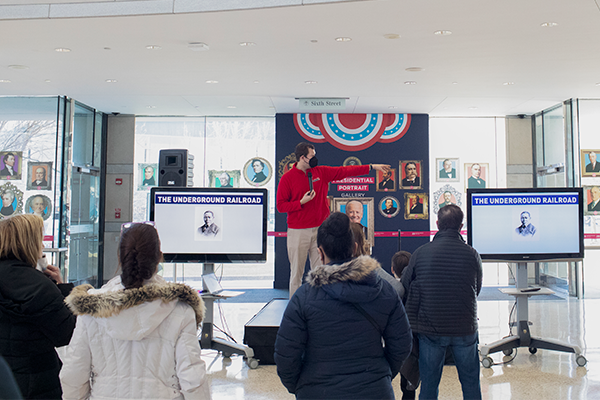
Black History Trivia Wheel
10 a.m.–3 p.m., The Story of We the People, Second Floor
Come spin the wheel and test your knowledge of key moments and figures in Black history like Hiram Rhodes Revels, Martin Luther King Jr., and Misty Copeland.
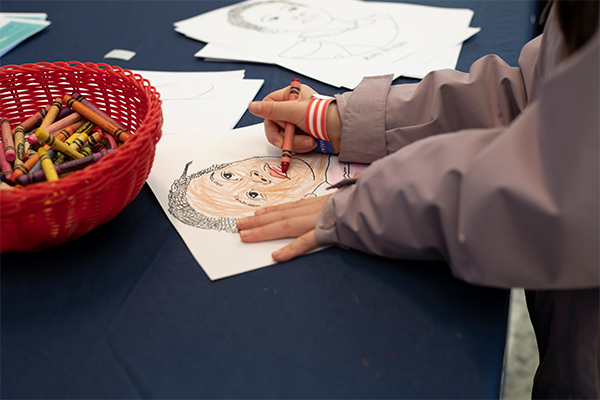
Trading Stories Craft
10 a.m.–5 p.m., Grand Hall Lobby
Explore the lives of influential African American figures while creating and collecting your own trading cards. Learn about the incredible lives of Mary Ann Shadd Cary, Hiram Rhodes Revels, Mae Carol Jemison, and more.
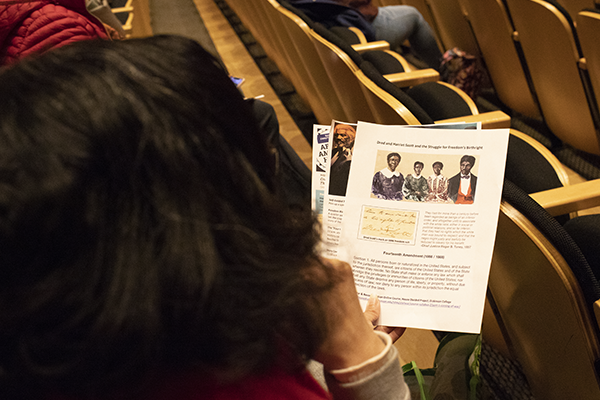
Self-Guided African American Artifact Scavenger Hunt
Pick up a special Black History Month brochure for a self-guided tour of the museum’s exhibitions, focusing on rare artifacts. These include a signed copy of the Emancipation Proclamation, a pen and inkwell used by Fredrick Douglass, and an original pennant from the March on Washington for Jobs and Freedom.
Artifact Highlights
11:45 a.m. and 1:45 p.m.
Hear the stories of influential people who fought for their rights in one of these 5–10-minute artifact talks, led by an NCC educator. See the list of topics below.
Emancipation Proclamation and the 54th Massachusetts Regiment
Civil War and Reconstruction: The Battle for Freedom and Equality, First Floor
Join us for an inside look at why President Abraham Lincoln issued the Emancipation Proclamation, what it meant for over 4 million Americans then held in bondage, and how it led to the creation of the first Black regiments in the war. This talk examines a copy of the Emancipation Proclamation signed by President Lincoln and special artifacts, including a ladder badge worn by a volunteer infantryman in the 54th Massachusetts Regiment.
March on Washington Pennant
The First Amendment, Second Floor
Explore the First Amendment through the lens of one the most influential demonstrations in our nation’s history, the March on Washington for Jobs and Freedom. Listen to the stories and experiences of civil rights organizations and activists who used their voice and agency to advocate for justice, domestic tranquility, and the general welfare of millions of disenfranchised Americans. This program highlights a March on Washington pennant that was carried by the participants of the march.
AKA Sorority Suffrage Letter
The 19th Amendment: How Women Won the Vote, First Floor
Learn about the first Black sorority, Alpha Kappa Alpha Sorority, Incorporated, founded at Howard University in 1908, and their fight for equal rights. This program looks at a letter from the sorority’s founder and incorporator, Nellie M. Quander, and discusses how Black women fought for equal suffrage and equal rights within the nation’s suffrage movement.
Online Programs
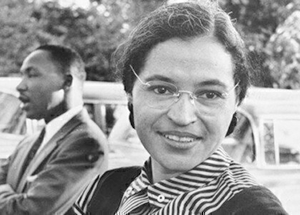
Civil Rights Virtual Tour With The Henry Ford
Tuesday, February 4 | Noon ET
Join the National Constitution Center, in virtual partnership with The Henry Ford, as we celebrate the birthday of civil rights leader Rosa Parks. Tour the bus Parks was riding the day she refused to give up her seat to a white passenger, which sparked the Montgomery Bus Boycott, a pivotal event in the Civil Rights Movement. You’ll also learn more about Parks’ life and work, get the opportunity to explore the archives of the Henry Ford Museum, and hear the stories of other people central to the fight for equality.
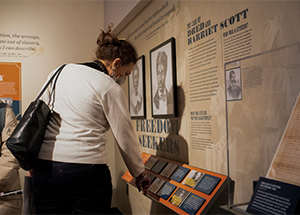
Civil War and Reconstruction Virtual Tour: The History of Black Labor
Tuesday, February 25 | Noon ET
In celebration of Black History Month, explore the Center’s compelling exhibit, Civil War and Reconstruction: the Battle for Freedom and Equality, as one of our educators leads viewers through the history and significance of Black labor during the Antebellum, Civil War, and Reconstruction periods. Learn how early labor systems defined African American culture and the many ways African Americans used their work to resist discrimination and protest against inequality. Along the way, you’ll hear stories of famous African American politicians, educators, and activists and their contributions to and recognition of Black labor.
Online Resources
Interactive Constitution: Classroom Edition Learning Materials
Browse our collection of video lessons and recordings of previous live classes, plus links to podcasts, blog posts, Interactive Constitution essays, and more. Great topics for Black History Month include:
Video
Martha S. Jones: Voting Rights of African American Women
Martha S. Jones, Society of Black Alumni Presidential Professor and professor of history at The Johns Hopkins University, joins National Constitution Center President and CEO Jeffrey Rosen for a discussion on the 19th Amendment, with a focus on voting rights of African American women, a topic professor Jones explores in her book, Vanguard: How Black Women Broke Barriers, Won the Vote, and Insisted on Equality for All. Jones also discusses her career as an author and historian, and answers questions from participants.
Watch VideoFOURTEEN: A Theatrical Performance
Study the words of Frederick Douglass, Frances Ellen Watkins Harper, and other American heroes with video highlights from FOURTEEN, a theatrical performance that sheds light on the Reconstruction era, the period after the Civil War, through dramatic interpretation of original texts.
Watch these clips:
The Declaration and Frederick Douglass
The 19th Amendment: How Women Won the Vote
In November 1920, millions of women across the country voted under the 19th Amendment. But for millions of other women, the fight was not over. Exhibit Developer Elena Popchock shares the story of the amendment’s ratification and legacy.
Watch VideoCongressman John Lewis: The March for Civil Rights
Civil rights icon Congressman John Lewis introduces March: Book One—the first in a graphic novel trilogy that shares his remarkable story with new generations. Book One spans Lewis’ youth in rural Alabama, his life-changing meeting with Martin Luther King Jr., the birth of the Nashville Student Movement, and their fight against segregation through nonviolent activism. A keynote speaker at the historic March on Washington in 1963, and a Medal of Freedom recipient from President Obama, the late congressman also explored modern constitutional questions related to equal rights.
Watch VideoPodcast
The Life and Legacy of Frederick Douglass
On this special episode of We the People, we examine the life of one of America’s most influential abolitionists, orators, writers, and statesmen: Frederick Douglass. Growing up as an enslaved person in Maryland, Douglass set himself apart by learning to read and write at an early age. After escaping from slavery, Douglass moved to Massachusetts where he became involved with local anti-slavery groups and newspapers. Ardently advocating for abolition, Douglass toured the country with William Lloyd Garrison and spoke extensively about the relationship between the Constitution and slavery in America.






